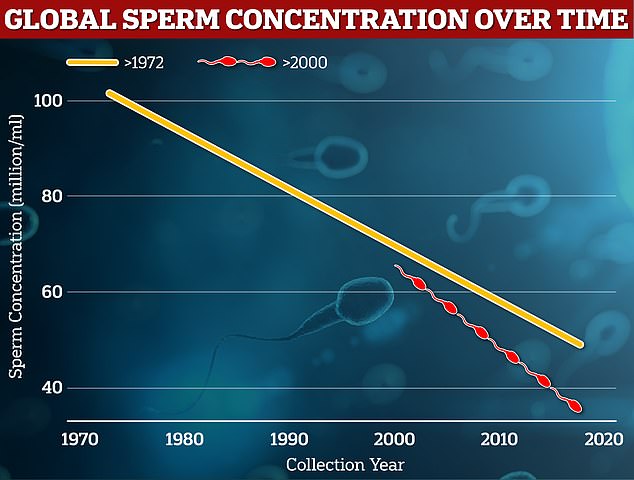An unexpected side effect of WFH culture? Sperm are now less active
When men stayed home during the pandemic, it appears their sperm also became less active.
Researchers made this finding while investigating the widely held belief that sperm counts are declining in men around the world.
While they didn’t find a drop in numbers, they did find that the sperm collected during the lockdown swam much less.
Scientists studied semen from 6,758 men between the ages of 18 and 45, collected by the world’s largest sperm bank, Cryos International in Denmark.
The study in the journal Human Reproduction found that sperm concentration samples taken from men who applied to become sperm donors between 2017 and 2022 “did not change significantly over a six-year period.”
Researchers studied semen from 6,758 men between the ages of 18 and 45, collected by the world’s largest sperm bank, Cryos International in Denmark. The study in the journal Human Reproduction found that samples taken from men who applied to become sperm donors between 2017 and 2022 showed that sperm concentrations “did not change significantly over a six-year period.”

Research has previously suggested that sperm counts drop in men. The photo shows a global study from 2022, published in the journal Human Reproduction Update. Graph shows: The rate at which sperm concentrations are declining worldwide is evident from samples collected between 1972 and 2000 (orange) and since 2000 (red)
But they did find that there was a big difference in motility: the ability of sperm to swim spontaneously.
Co-author Professor Allan Pacey from the University of Manchester said: ‘It is widely believed that sperm counts are falling in men.’
He said a recent “meta-study” – which collected data from 44 studies – by Dr. Hagai Levine of the Hebrew University of Jerusalem found that sperm counts in men worldwide have increased by as much as 2.64 percent per year since 2000 decreased.
However, Professor Pacey said: ‘We have seen no such change and that suggests that in this population of sperm donor applicants, in these four Danish cities, sperm concentrations have not changed between 2017 and 2022.’
But the total number of swimming sperm submitted for testing had fallen by 16 percent and 22 percent respectively between 2019 and 2022.
Co-author Professor Robert Montgomerie from Queen’s University, Canada said: ‘The decline in sperm motility measurements between 2019 and 2022 was an unexpected finding.
‘This decline roughly corresponds to the start of the global Covid pandemic.
‘While there is no evidence that the SARS-CoV-2 virus directly affects sperm, we speculate whether the widespread lockdowns may have led to changes in the work patterns, diet and levels of physical activity that we already know they can affect sperm. mobility.’
The study authors were unable to collect information about the health or lifestyle of the men applying to become sperm donors, which could help identify factors that may be responsible for the decline in motility the sperm.
The current study only looked at samples collected in 2017, as more accurate computational methods were used to count sperm from that date onwards – before this count was carried out manually.
